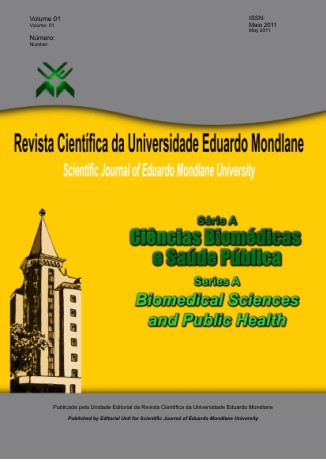DESAFIOS SOCIO-ECONÓMICOS DE MOÇAMBIQUE NO CONTEXTO DA COVID-19
Resumo
O impacto da COVID-19 difere de país para país, os desafios e perspectivas sócio-económicas tem estado a impactar na economia e consequentemente, os índices de pobreza e desigualdades sociais incrementaram à escala global. Desta forma, o presente estudo visa analisar os desafios e impacto nesta perspectiva nas sociedades, economias e grupos vulneráveis, em particular para o caso de Moçambique. O estudo visa compreender os avanços, recuos e desafios de cariz sócio-económicos que o país enfrenta, dados esforços do governo, sector privado, sociedade civil e parceiros de cooperação no sentido de fazer face à pandemia do COVID-19 em Moçambique, através de uma abordagem da análise estatística descritiva (proporções, frequências e indicadores macroeconómicos) - observação simples ou não estruturada e observação estruturada e entrevistas semi-estruturadas a especialistas da área; análise e tratamento de informações em pesquisa qualitativa. As conclusões finais mostram que o Governo de Moçambique tem desenvolvido esforços com vista a assegurar que se contenha a propagação e alastramento comunitário do vírus, com destaque para a Declaração do Estado de Emergência, medidas específicas adoptadas que resultaram na interrupção parcial da actividade económica e medidas de políticas fiscais como o relaxamento do IVA em produtos essenciais que compõem a cesta básica dos Moçambicanos. Estima-se que o impacto da COVID sobre estes indicadores de bem-estar deverá ser diferenciado dependendo do grupo de renda a que o país pertença.
Referências
Africa CDC. (2020). “Outbreak Brief 22: COVID-19 Pandemic – 16 June 2020.” Disponível em: https://africacdc.org/download/outbreak-brief-22-covid-19-pandemic-16-june-2020/ Acessado em: 16 de Junho de 2020.
Baldwin e di Mauro. (2020). “Mitigating the COVID Economic Crisis: Act Fast and Do Whatever It Takes.” Março de 2020. Disponível em: https://voxeu.org/content/mitigating-covid-economic-crisis-act-fast-and-do-whatever-it-takes; Acessado em: 10 de Junho de 2020.
Banco de Moçambique. http://www.bancomoc.mz/fm_pgTab1.aspx?id=385 Impacto Esperado as Medidas Tomadas pelo BM para Mitigar os Riscos da COVID na Economia. Março de 2020. Disponível em: http://www.bancomoc.mz/fm_pgTab1.aspx?id=385; Acessado em: 11 de Junho de 2020
Boletim Científico do N.⸰1, MISAU, 2020. https://www.misau.gov.mz/index.php/covid-19-boletins-diarios Disponível em: file:///C:/Users/User/Downloads/Boletim%20Cientifico%20COVID-19%20%20NUMERO%201%2003ABRIL2020_IJ.pdf; Acessado em: 10 de Junho de 2020.
BOLETIM DIÁRIO COVID-19 Nº 92.. Ministério da Saúde, Junho de 2020. https://www.misau.gov.mz/index.php/covid-19-boletins-diarios Disponível em: http://www.misau.gov.mz/index.php/covid-19-boletins-diarios; Acesso em: 18 de Junho de 2020.
Ferretti et al. (2020). “Quantifying SARS-CoV-2 transmission suggests epidemic control with digital contact tracing.” Science 08 May 2020:Vol. 368, Issue 6491, eabb6936
Disponível em: https://science.sciencemag.org/content/368/6491/eabb6936 Acessado em: 16 de Junho de 2020.
Linkov, BD Trump, W Hynes (2019) Resilience Strategies and Policies to Contain Systemic International Publishing. I Linkov, BD Trump, K Poinsatte-Jones, P Love, W Hynes, G Ramos (2018) Resilience at OECD: Current State and Future Directions IEEE Engineering Management Review 46 (4), 128-135Disponível em: http://www.oecd.org/naec/projects/resilience/NAEC_Resilience_and_Covid19.pdf Acessado em: 16 de Junho de 2020.
MINISTÉRIO DA ECONOMIA E FINANÇAS.PROPOSTA DE LEI DO ORÇAMENTO DO ESTADO PARA 2020. Abril de 2020. Disponível em: file:///C:/Users/User/Downloads/Proposta%20de%20Lei%20do%20Or%C3%A7amento%20de%20Estado%202020%20-%20AR%20-06042020.pdf Acessado em: 14 de Junho de 2020.
MINISTÉRIO DA ECONOMIA E FINANÇAS, Direcção Nacional de Estudos Económicos e Financeiros. Pobreza e Bem-estar em Moçambique: Quarta Avaliação Nacional. Outubro de 2016. Disponível em: https://www.wider.unu.edu/sites/default/files/Final_QUARTA%20AVALIA%C3%87AO%20NACIONAL%20DA%20POBREZA_2016-10-26_2.pdf; Acessado em: 10 de Junho de 2020.
Nicola, Maria et. al. (2020). “The socio-economic implications of the coronavirus pandemic (COVID-19): A review.”Disponível em: https://www.ncbi.nlm.nih.gov/pmc/articles/PMC7162753/ Acessado em: 14 de Junho de 2020.
Onyekwena e Ekeruche. (2020). “Understanding the impact of the COVID-19 outbreak on the Nigerian economy.” Disponível em: https://www.brookings.edu/blog/africa-in-focus/2020/04/08/understanding-the-impact-of-the-covid-19-outbreak-on-the-nigerian-economy/ Acessado em: 13 de Junho de 2020.
WFP-Regional Bureau. (2020). COVID-19 Level 3 Emergency. External Situation Report. Disponívelemhttps://docs.wfp.org/api/documents/edea71639137476fbd600cb051bf0716/download/?_ga=2.80242199.18655450.1593072795-1864444658.1587377445; Acessado em: 10 de Junho de 2020.
World Economic Outlook. The Great Lockdown. International Monetary Fund, April 2020. Disponível em: https://www.brookings.edu/blog/africa-in-focus/2020/04/08/understanding-the-impact-of-the-covid-19-outbreak-on-the-nigerian-economy/ Acessado em: 14 de Junho de 2020.


